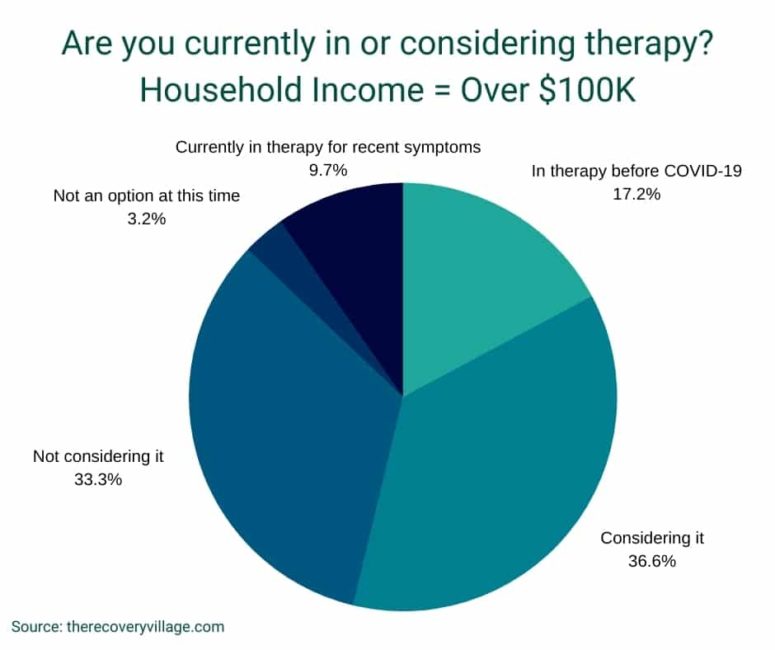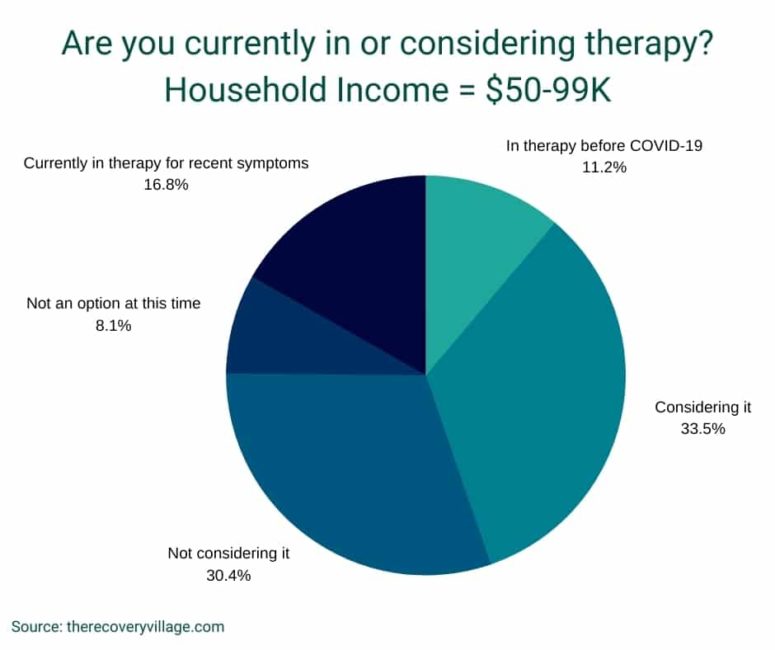Does Income Level Help You Cope With COVID-19?

Our survey found that South Florida households with lower income are drinking and using drugs at lower rate compared to middle & high income households but have less access to help when needed.
With over 40% of Florida’s COVID-19 cases, South Florida has been the epicenter of the state’s coronavirus outbreak. To better understand how the pandemic is impacting the South Florida community, we surveyed 500 South Florida residents about their mental health and substance use. With income level emerging as a predictor of coronavirus infection, we also wanted to understand how income level is impacting substance use and mental health.
The results showed that many respondents reported higher rates of drug and alcohol use. Nearly 80% of participants said COVID-19 had impacted their mental health and almost half reported coping with stress or mental health symptoms as the reason for their substance use. Here’s what else we found.
The Recovery Village Survey Results by Income Level
We surveyed 500 South Florida residents about their mental health and use of drugs and alcohol in the past month. Note: Some questions asked respondents to select each option that applied, so in a few instances, the total percentage will be greater than one hundred.
When referring to household income level, we’ll define those groups as following:
- Lower income households = households making less than $49k annually
- Middle income households = households making between $50-99k annually
- High income households = households making over $100k annually
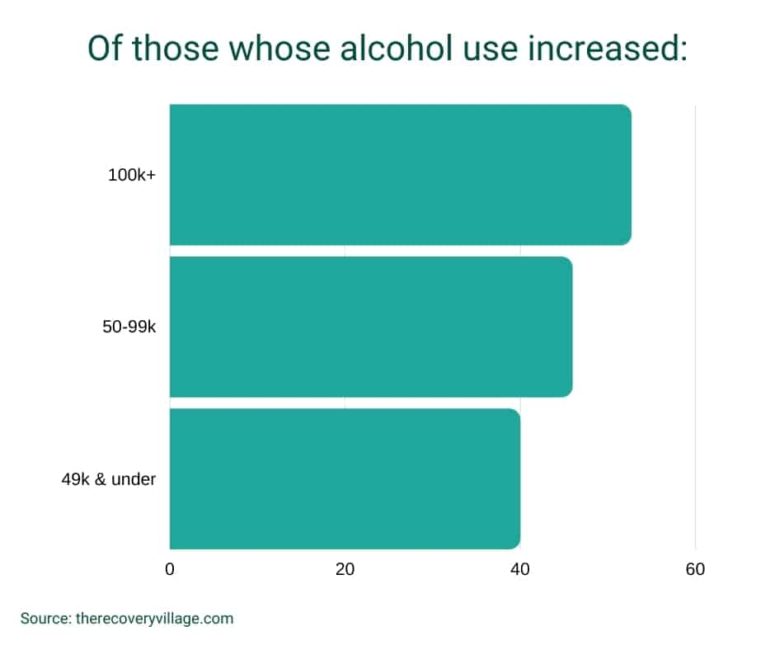
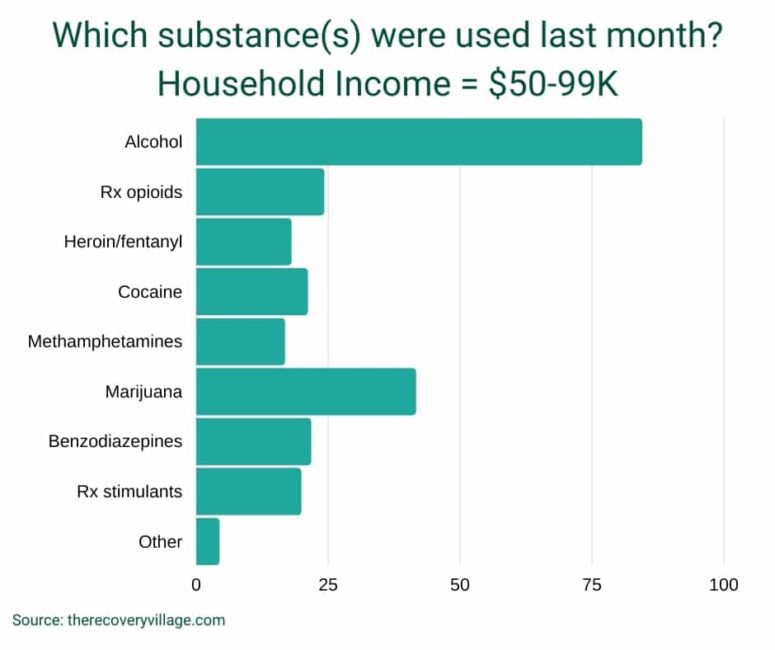
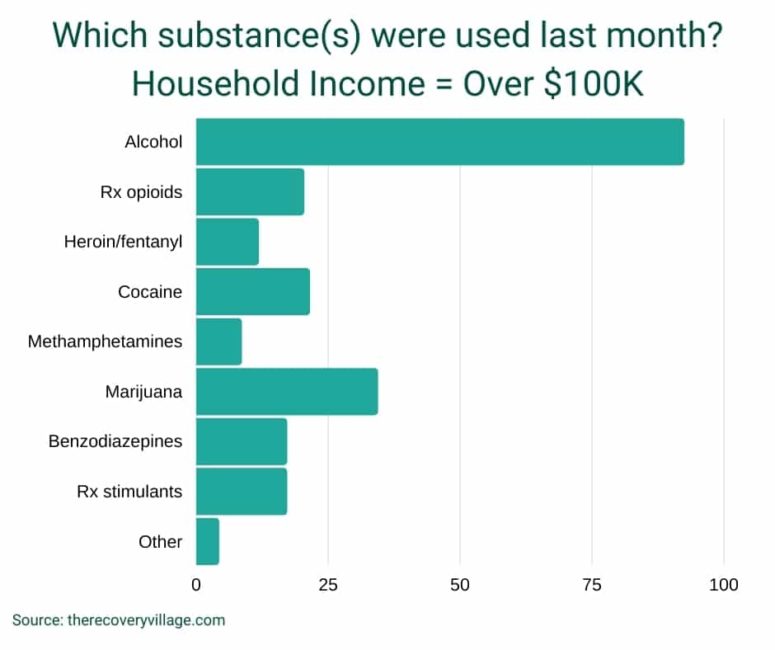
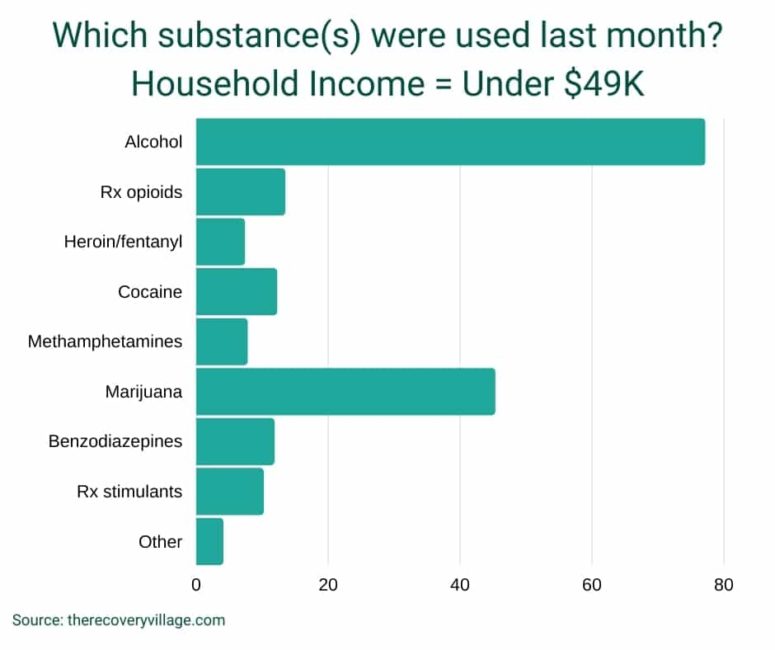
Substance Use in South Florida
Rate of alcohol use: Many respondents reported higher rates of past-month drug and alcohol use. The rate of past-month alcohol use grew with household income:
- 52.69% of high income households
- 45.96% of middle income households
- 40% of lower income households
Rate of drug use: The inverse was true of drug use. The rate of reported past-month decrease in use corresponded with decreasing household income:
- 13.98% of high income households
- 15.53% of middle income households
- 16.33% of lower income households
Based on their past-month consumption, 57% of those who drank and 60% of drug users said they felt they should cut back. All groups selected coping with stress when asked what was the biggest reason for past-month substance use, but the rate grew with income level:
- 38.71% of high income households
- 32.3% of middle income households
- 28.16% of lower income households
95%
more likely to use meth than lower income households
84%
more likely to report using benzos than the lower income families
80%
more likely to use prescription opioids than low income households
While majorities in all groups reported using alcohol, there were some differences between substances used and income level. Middle income households in particular reported higher rates of drug use compared to other groups.
In fact, middle income households were:
- 95% more likely to use meth than lower income households and 116% more likely than high income households.
- 80% more likely to use prescription opioids and 145% more likely to use heroin or fentanyl than low income households. They were 19% more likely to use prescription opioids and 52% more likely to use heroin or fentanyl than high income households.
- 95% more likely to use prescription stimulants, like Adderall and Ritalin, than lower income and 16% more likely than high income households.
- 84% more likely to report using benzodiazepines, like Xanax and Ativan, than the lower income households and 26% more likely than high income households.
Across all households, stress, mental health symptoms and boredom were big drivers of substance use.
In the middle income households, a few other reasons stood out:
- Nearly 20% said they were physically dependent on a substance, compared to 9.68% of high income households and 10.20% of lower income households.
- 57% reported their substance use as recreational or social, compared to 47.31% of high income households and 44.49% of lower income households.
- 30% said substance use was part of their daily routine, compared to 25% of high income and 17% of lower income households.
As high unemployment rates persist and more employers, including middle level management, continue to make tough decisions about their workforce, unhealthy coping methods (like substance use) and adverse mental health impacts may be another one of COVID-19’s lasting legacies.
COVID-19 Impacts to Mental Health
All three income groups reported that COVID-19 has impacted their mental health. There were some slight variations in the symptoms reported:
- Low income households reported higher rates of depression/loneliness (70.5%) compared to the middle (68.5%) and higher (63.4%) income groups.
- The middle income group was 26% more likely to experience anger/agitation than the lower income household and 19% more likely than the high income households.
- All three reported sleep issues at similar rates.
Reports of anxiety/nervousness increased with income level:
- 87.32% of high income households
- 77.95% of middle income households
- 67.89% of low income households
While these symptoms were reported as new for the majority of all groups, the rate increased with income level:
- 74.65% of high income households
- 58.27% of middle income households
- 55.79% of lower income households
Of those for whom symptoms were not new, middle income households also said that their symptoms were more severe now than in the past at a higher rate (71.7%) than either of the other groups (both 44%). These results, including increases in substance use, demonstrate a need for mental health resources and healthy coping strategies in the South Florida community.
Highlighting the Need for Access to Mental Health Resources
The impact of COVID-19 is still being felt, and in some cases still developing. Families are making decisions about going back to school and fall activities. More temporary furloughs may become permanent as the impact of the coronavirus continues to weigh on the economy. If workers lose their jobs and benefits, access to critical care for mental health and substance use could become more limited.
This is troubling because people are already considering making changes to improve their overall health and wellness. When survey participants were asked if they felt they should cut back on their current substance use, the majority of all groups responded yes. This was true for those who drank or used drugs.
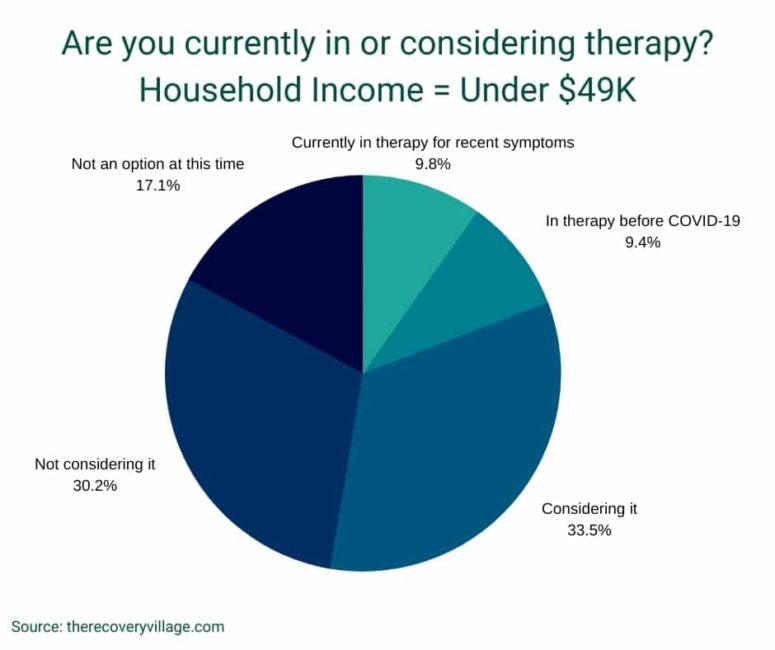
Due to their reported symptoms, South Floridians are also considering mental health interventions to help. We found striking differences across the income groups for who had access to mental care both before the pandemic and currently:
- 17.2% of high income households were in therapy prior to the COVID-19 outbreak versus just 9.8% and 11.18% of lower and middle income households.
- All three income groups reported they were “considering” therapy at similar rates (33-37%).
- Lower income households were 112% more likely than middle income and 431% more likely than high income households to report that therapy is “not an option at this time.”
Managing mental health symptoms and getting support for stopping substance use are important ways to invest in your overall health and wellness as well as the health and wellbeing of your community. While South Florida has recently committed resources, including $40 million for a project aimed at prevention and treatment for mental illness and substance use disorders, more investment is needed to help the community cope with the impacts of COVID-19 and thrive in its aftermath. As a health care provider and behavioral health leader, we are dedicated to raising awareness about available treatment options and expanding access to treatment through our presence in local communities and by offering telehealth options for those who are unable or uncomfortable with traveling to a facility.
To help support South Florida residents facing addiction or mental health concerns, The Recovery Village operates drug and alcohol rehab centers in Lake Worth, Atlantis and Miami, in partnership with Baptist Health South Florida. We offer a full spectrum of care, including telehealth for ongoing outpatient treatment and teletherapy for substance use and mental health conditions. Contact us to learn more about a treatment program that can meet your unique needs.
For press inquiries, email [email protected]
Our Other COVID-Related Studies:
- Survey Shows Drug and Alcohol Use on the Rise During COVID-19 Pandemic
- COVID-19 Map: Tracking Substance Usage During Coronavirus
- Mental Health in the Time of COVID-19
- Kids Anxious About Going Back to School After COVID
- South Florida Residents Experiencing “Coronavirus Anxiety” As Pandemic Lingers On
- COVID Resource Center
The Recovery Village aims to improve the quality of life for people struggling with substance use or mental health disorder with fact-based content about the nature of behavioral health conditions, treatment options and their related outcomes. We publish material that is researched, cited, edited and reviewed by licensed medical professionals. The information we provide is not intended to be a substitute for professional medical advice, diagnosis or treatment. It should not be used in place of the advice of your physician or other qualified healthcare providers.
